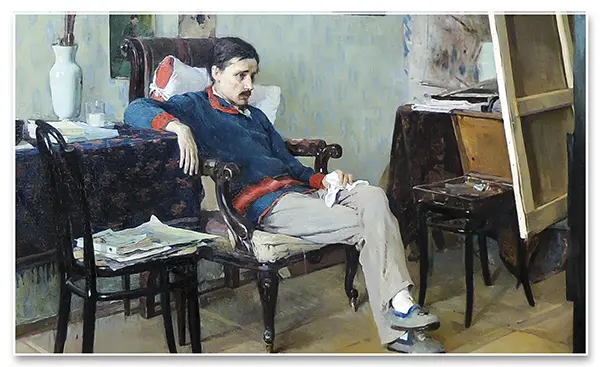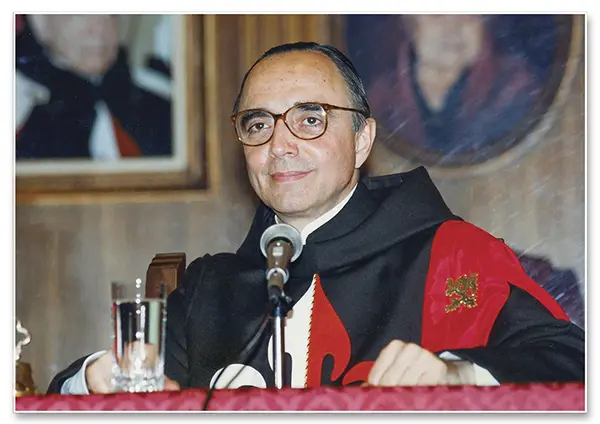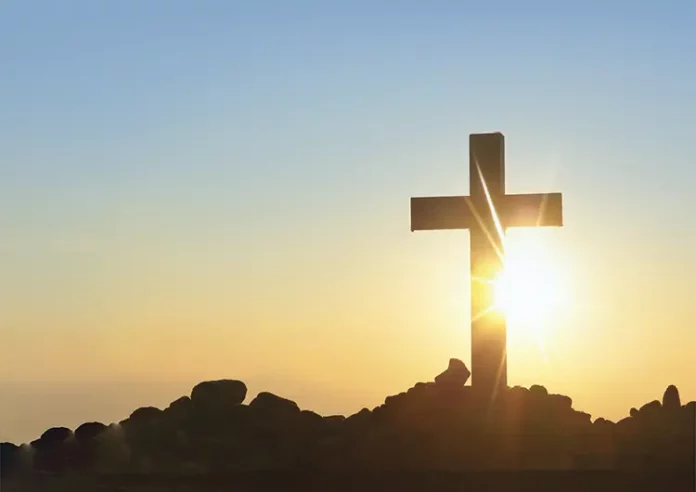I once came across an article written on the subject of solitude. It was a story about a man with an unwelcoming appearance, who described his preferences and his lifestyle, stating that he so enjoyed complete isolation that he had chosen not to marry, because the idea of living with others horrified him. He lived his life alone, completely closed in on himself. He took no interested in anyone else and was annoyed whenever someone came to visit and touched his belongings…
When I read these statements, I immediately remembered Dona Lucilia. She was the exact opposite! At ninety-two years of age, she was concerned about the people who came to visit her son, because they often had to wait to be seen. So, in order to prevent them from becoming distressed by the delay, she would invite them into the living room and keep them company, so as to make their wait more pleasant.
What is the difference between these two types of souls?

“The artist”, by Aleksey Mikhailovich Korin – Tretyakov Gallery, Moscow
Two positions of the soul in the face of pain
When analysing her treatment of others, we realize that there are two different stances in the face of suffering. The first is that of someone who avoids the cross, considering it undesirable, and clings to the enjoyment of life, seeking only to please himself; in other words, he is selfish.
The second is that of someone who, on the contrary, has embraced the cross with a view to the good of others. On certain days, Dona Lucilia may have felt ill or may not have slept at night and would have liked to remain in repose; but she made an effort to give herself completely to others, because she loved them as herself.
Woe to those who are insensitive to the miseries and needs of their neighbour, and seek to escape the suffering they should face! These people, if they live in peace, are deluded; and the delusion will be their punishment. Sooner or later the cross, enlarged, will pursue them, and they will have to continue on their way carrying a larger one than was intended for them. And, after spending their life between aversions and false delights, they will probably go to the place of eternal suffering, where all is bitterness and mad frustration.
Someone, however, could raise the following doubt: does the fact of having enjoyed a certain well-being in this world or having been held in high esteem by others make one deserving of infinite punishment?
No. The problem is not in having possessions or a good position. Wealth, abundance, career, happiness, prestige or the admiration of others are not in themselves elements for condemnation, but on the contrary, gifts from God, which are appropriate even in the life of a saint. The error lies in the way a person values them and the intention with which they seek them.
The voluptuous, full of pride and sensuality, who practise injustice and live for constant gratification, disregarding the law and rebelling against God, are the ones upon whom the curse declared by Our Lord in the Gospel will fall: “Woe to you that are rich… Woe to you that are full now… Woe to you that laugh now… Woe to you, when all men speak well of you…” (Lk 6:24-26). Voluntarily and knowingly, they sacrificed on the altar of earthly gain all the eternal goods they would have received in the heavenly homeland.
Those, however, who accept suffering consciously and clearly, with a good disposition of soul, find the secret to penetrating the Soul of Our Lord Jesus Christ and uniting themselves more closely to Him. Whenever they endure hardships, they know they are more united to Him.
The benefits of suffering
Now, we may ask ourselves why suffering is so necessary. One reason is that, without it, creatures easily forget their dependence and close in on themselves.
Many, many people who enjoy a life full of satisfaction and delights – especially in the modern world, equipped with machines that work splendidly, and immersed in the full-colour atmosphere of cinematographic story lines and the “happy ending” mentality – become accustomed to the idea that everything is going as well as possible and gradually fall into the tendency to think of themselves as gods.
This is what happened with the fallen angels, who desired to usurp the throne of the Most High soon after their creation (cf. Is 14:13-14), and with our first parents, when they sought to be like gods (cf. Gn 3:5).
Another reason for Providence to allow us to undergo tribulations is so that we do not fall into relativism and negligence through lack of vigilance. Since we are living in a land of exile, where we must practise the virtues through effort, God desires that we become strong warriors, in order to give us more merit.
In the Gospels we find some episodes that serve as a lesson in this regard.

Msgr. João in 1997
The “spurs” of suffering
St. Matthew tells us that when Jesus was at table with publicans and sinners, the leader of the synagogue came into the banquet hall to speak with Him (cf. Mt 9:18). We know that in the perception of the Pharisees, who were strict formalists, mingling with sinners was considered shameful, and they reproached Our Lord and the Apostles for sharing a meal with people of that sort.
What moved this man of high rank, whose responsibility it was to instruct the people to respect the Law, to confront public opinion and seek out the Divine Master in this circumstance? Would not the Pharisees – his own subordinates! – accuse him of transgressing the rules and moral prohibitions? Should he not have remained at the door and, with the authority proper to his eminent title, send a servant to Jesus to ask Him to come out to speak to him?
He defied the atmosphere surrounding him and entered the banquet hall to have a dialogue with Our Lord. Why? Because his heart was pierced by a cruel affliction: his only daughter, a twelve-year-old girl whom he loved, was ill and near death.
It is undeniable that this man had an incipient faith and that the fame of the Saviour’s many miracles, His luminous sanctity and His attractive goodness had touched him inwardly. But it was the tempest and the trial that solidified confidence in his soul and made him overcome his scruples. If he were not experiencing this crisis, he would not have prostrated himself before Our Lord begging: “Come and lay your hand on her, and she will live.” Misfortune benefitted him by removing the scales from his eyes and opening them.
A little further on in the Gospel we encounter the scene of the haemorrhaging woman who had been ailing for twelve years and who obtained an instantaneous cure from Our Lord (cf. Mt 9:20-22). Her magnificent act of faith marked history and will profit humanity until the end of the world.
Would this lady, who proceeded so admirably, have elbowed her way through the crowd and struggled into its midst, facing the tension of concealing such a humiliating condition, according to the conceptions of the time, had it not been for the affliction that was torturing her? Would she have touched the mantle of the Great Wonderworker with that unknown, mysterious, and almost incomprehensible impetus that only pain, suffering and dependence inspire?
In her case, as well as in that of the synagogue leader, two values met: on one hand, need and anguish; on the other, faith, hope and charity. However, when the latter are inconsistent and imperfect, there is no other way: the spurs of suffering are needed to set them in motion.
Suffering impels us to seek God
These two examples are profoundly elucidative of the vital role that suffering plays in life. Hardship corrects camouflaged thoughts, amends prejudices and erroneous criteria; it frees the soul from self-love and false points of honour; it makes anger and resentment evaporate, bringing the spirit into consonance with its true goal. Pain enlightens man to be aware – and even convinced – of his weakness; it humbles him and helps him to acquire seriousness.
How marvellous is God’s wisdom in the course of events! How much good suffering has done on the face of the earth! How many graces have been obtained because of it! How often have the black hues of a well-accepted failure been transformed into golden light! And how often have the cold floors of a cathedral, a church or an oratory been warmed by the knees of those who suffer! If there were no anguish, these stones would only occasionally be touched, by a quick genuflection…
Suffering is a blessed guest, an element of friendship, a gift from God through which He often visits us. It makes people bend the knee and remain there, implore there, turn to the Lord there and there unite with Him. Pain helps the creature to raise his hands in search of the Creator and to join them in asking Him to extricate him from his insufficiency and lead him to where perfect love would have taken him.
A means of proving our love

The resurrection of the daughter of Jairus and the cure of the haemorrhaging woman, St. Andrew’s Church, Nuthurst (England)
Here we find yet another reason that explains why God sends us tribulations: it provides us with an opportunity to show Him through concrete acts and gestures, practised with detachment and total disinterest, that we truly love Him.
Love is above all else; it is stronger than pain. Great love is worth more than great pain.
Our love must be such that sickness, misfortunes, calumies, mistreatment, excessive work, disappointments and setbacks in our apostolate, ingratitude, spiritual aridity… in short, all the difficulties that are sent to us by the hand of Providence should be received willingly, with courage and magnanimity of spirit, because in this way our intimacy and union of soul with our Lord Jesus Christ will grow and our enthusiasm and fervour will become stronger.
This is the mainstay of our interior life: a complete renunciation, full of joy; a delicious torment; tragedy and adventure intertwined, enlivening each other instead of excluding each other! For what matters is to have this love, to know, above all else and in all circumstances, how to consult the divine interests above our own whims and preferences, ready to let ourselves be crucified if necessary. If we have love, we will lack nothing and we will gain glory.
The Son suffered, for the Father wished to give Him all glory
First of all, we must bear in mind the example of Our Lord Jesus Christ. During His earthly life, He encountered a complete lack of response among the Jewish people to His proclamation of the Kingdom of God, which later culminated in the Passion.
In that supreme anguish, He faced the pain of the scourging, the crowning with thorns and the piercing of the nails. He was transformed into a worm, and there were so many open wounds on His body that His bones could be counted (cf. Ps 21:7, 18). After death, they pierced Him with a lance, so that there was no blood left in His body.
And there was also a torment worse than the physical ones: He was presented before the mob, the soldiers and the executioners as a criminal, laden with the sins of all humanity. And Jesus accepted these insults as if He deserved them, without complaint or revolt, without any show of dissatisfaction.
If the least gesture of His, even the blink of an eye, was infinite and would have sufficed to make reparation for all the sins against God, why then did He bear all these wounds? Why did He, the Supreme Good, have to give His Blood and die on the Cross between two thieves? Why was the Father not moved when He heard the prayer that His Only-begotten Son addressed to Him from His human nature: “Father, all things are possible to Thee; remove this cup from Me; yet not what I will, but what Thou wilt” (Mk 14:36)?
Since the Son had become incarnate to bring Redemption, the Father wanted all the merits for Him as Man. And it was by bearing this terrible hour, in which the power of darkness seemed to be victorious, and feeling abandoned by God Himself, that He, after the triumphant cry, “Consummatum est”, would obtain full and total glory.
His divine words were then fulfilled: “The hour has come for the Son of man to be glorified. Truly, truly, I say to you, unless a grain of wheat falls into the earth and dies, it remains alone; but if it dies, it bears much fruit” (Jn 12:23-24).
From the seed of isolation, of failure and of apparent defeat, sown deep in the earth, would germinate true marvels of holiness over the course of the centuries – marvels which are, however, merely the first pale aurora of those to come in the future.
Let us hold fast to Our Lady in order to suffer with joy
When we encounter difficulties and feel the claws of suffering closing on us; when catastrophes, disasters and tragedies strike us; when we are unsuccessful; when we encounter obstacles of natural and preternatural origin, we should not be alarmed or astonished.
Far from taking a cowardly attitude in the face of pain, falling into interior discouragement or even murmuring against God, let us kneel down and bless all the evils and sufferings that come upon us. Following the example of the Redeemer, let us ask for the strength to drink the chalice of pain to the last drop and to have the courage of a knight who, never retreating, carries his cross to the end.
In the measure that earth, dust and darkness fall upon us, we will be able to germinate and participate in the fruitfulness of Our Lord and the divine capacity that He gave Mary, at the foot of the Cross, to bear fruit as a Mother. To her, who was a small and at first sight insignificant seed, so overlooked and disregarded, the whole of humanity was given as children, in the person of St. John (cf. Jn 19:26).
Let us hold fast to Our Lady in order to suffer with joy and to quickly reach the supernatural riches and wonders, where we will come to know “the breadth and length and height and depth” (Eph 3:18) of Jesus’ love. May our wills become enamoured with a mystical inebriation of love for the Cross! From now on, may the Cross be our banner, the standard that enraptures and inflames us until the last breath of life!
God’s provident goodness will become clearer to us when the storm clouds pass and we see the clear firmament of a starry night, or rather, the azure sky with a sun that is beginning to rise for the establishment of the Reign of Mary! ◊
Excerpts from oral expositions given
between 1990 and 2009


